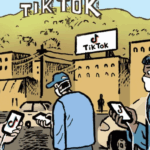As with matrimony, the road to acquisition is paved with dalliances – some serious and some … less so.
For evidence, look no further than the DSP Rocket Fuel’s impending sale to Sizmek for $145 million, announced on July 18.
That deal is expected to finalize in days, after Rocket Fuel’s 30-day “go-shop” deadline, during which it may accept bids from other buyers, expires on Aug. 16.
According to a US Securities and Exchange Commission (SEC) filing dated Aug. 2, the demand-side platform hired investment bank Needham & Co. in November to jumpstart the sale of Rocket Fuel’s media services business.
Here’s a rundown of what panned out after Rocket Fuel’s bankers came onboard:
December 2016: It’s holiday shopping season! At Rocket Fuel’s request, its bankers shopped it around to 69 possible strategic acquirers (not including Sizmek) and two private equity firms (not including Vector Capital, which owns Sizmek).
At the same time, Rocket Fuel CEO Randy Wootton met with representatives from Vector, who informed him they were interested in buying Rocket Fuel – but didn’t propose a price.
January 2017: Rocket Fuel reveals a significant restructuring and lays off 11% of its staff. (Read AdExchanger coverage.)
Feb. 14: It’s Valentine’s Day and things start to heat up for Rocket Fuel. While Vector informs Wootton that the PE firm would submit an unsolicited proposal to acquire all of Rocket Fuel that week, Rocket Fuel fields interest from two other companies.
Party A proposed to acquire its media services business for $80 million to $85 million. Sizmek, a Vector affiliate, proposed to acquire all of Rocket Fuel for $3.40 a share. Rocket Fuel’s board meets with the bankers, but still sees value in preserving Rocket Fuel’s platform solutions business as a standalone entity.
Feb. 21: Party B enters the picture, valuing Rocket Fuel’s media services business at about $130 million to $150 million. At its request, Rocket Fuel would divest platform solutions to another acquirer. Only after that divestiture would Party B invest and acquire a majority stake in Rocket Fuel.
February through April: Rocket Fuel’s bankers contact 24 potential strategic acquirers (not including Sizmek) and 13 private equity firms other than Vector. Rocket Fuel enters confidentiality agreements with 30 of those entities.
March 30: Party A proposes to acquire media services for $40 million followed by another $40 million investment in the company, citing declines in Rocket Fuel’s media services business.
April 21: A private equity firm, referred to as Party C, wants to acquire all of Rocket Fuel for just over $2 a share. As an alternative, Party C offers to acquire platform solutions for $65 million to $75 million.
April 24: Sizmek indicates interest in buying Rocket Fuel for $4 to $5.25 per share, and asks the DSP to be exclusive for five weeks. Rocket Fuel’s deal committee still wants an open relationship because $4 to $5.25 was deemed too “wide” a bid window.
Party C, at the same time, expresses interest in acquiring media services for $80 million with up to $60 million payable in the future based on performance. Later it issues a revised bid to acquire all of Rocket Fuel for $4.60 to $4.90 per share.
May 1: Party C and Sizmek both begin a due diligence process to review Rocket Fuel. But Party D swoops in and expresses interest in acquiring media services for some $100 million at closing with an additional $15 million over the next three years.
On May 18, Party C withdraws its proposal, citing concerns over Rocket Fuel’s Q1 2017 results. In late May, Party D drops out, saying it lacked sufficient financing to continue.
May 25: Sizmek narrows its bid window to $3.50 to $3.80 per share, stating Rocket Fuel’s “revenue and profitability performance necessitated the lower purchase price.” It later revised that up to $3.50 to $4 per share.
June 6: Rocket Fuel and Sizmek enter an exclusivity agreement for negotiation that would last through June 20, after Rocket Fuel’s deal committee pushed for $4 per share. After all, the company IPO’d at a much higher $29 per share in 2013.
June 20: Sizmek informs Rocket Fuel that forecasted decreases in net revenue and adjusted EBITDA made it “impossible” for Sizmek to pony up $4 per share to buy Rocket Fuel.
July 3: Sizmek revises its bid to $2.60 per share (for a total consideration of about $145 million).
July 18: After a bunch of discussions, Rocket Fuel and Sizmek announce their commitment to merge.
The order and depiction of these events have been condensed and edited.
Correction: Rocket Fuel’s go-shop period ended Aug. 16, not Aug. 18, as an earlier version of the story stated.













